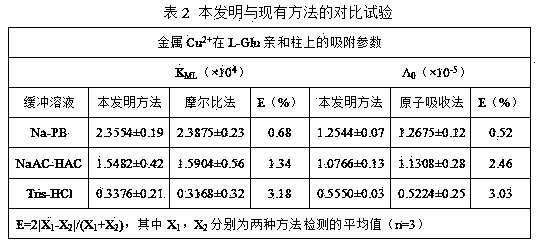Method for determination of metal ion adsorption stability parameters on fixed-metal affinity column
A technology of metal ions and stability constants, applied in the measurement of color/spectral characteristics, etc., can solve the problems of large error in measurement results, cumbersome detection process, poor reproducibility, etc., and achieve the effect of data stability
- Summary
- Abstract
- Description
- Claims
- Application Information
AI Technical Summary
Problems solved by technology
Method used
Image
Examples
preparation example Construction
[0032] ( ) Preparation of epoxy silica gel: Weigh 2 g of dry acidified silica gel, put it in a flask, add 40 mL of 0.1 mol / L NaAc-HAc buffer solution (pH 4.0), sonicate for 2 min, and add 2 mL of γ-GLDP dropwise , continued the reaction at 90 °C for 2 hr with stirring, cooled, filtered and washed with water until neutral, then dried and stored.
[0033] ( ) Preparation of aminocarboxylic acid chelating agent: take 30 mL 1 mol / L Na 2 CO 3 , add 1.5 g of ammonia carboxyl agent, adjust the pH to 8.5 after dissolving, and add 2 g of epoxy silica gel to it. Stir and react continuously at 60-65°C for 12 h, filter and wash with water, 10% HAc and water until neutral to obtain aminocarboxylic acid chelating agent.
[0034] ( ) Filling of aminocarboxylic acid chelating agent: Take 2 g of aminocarboxylic acid chelating agent synthesized above, mix it with 40 mL isopropanol as solvent, pour it into the packing column, and automatically fill it under 400 kg pressure for 20 min ( ...
Embodiment 1
[0053] Embodiment 1 Accuracy and precision test
[0054] Preparation of L-Glu affinity column:
[0055] ( ) Preparation of epoxy silica gel: Weigh 2 g of dry acidified silica gel, put it in a flask, add 40 mL of 0.1 mol / L NaAc-HAc buffer solution (pH 4.0), sonicate for 2 min, and add 2 mL of γ-GLDP dropwise , continued the reaction at 90 °C for 2 hrs with stirring, cooled, filtered and washed with water until neutral, then dried and stored;
[0056] ( ) Preparation of L-Glu chelating agent: Take 30 mL 1 mol / L Na 2 CO 3 , add 1.5 g L-Glu, adjust the pH to 8.5 after dissolving, and add 2 g epoxy silica gel to it. Stir continuously at 60-65°C for 12 h, filter and wash with water, 10% HAc and water until neutral to obtain L-Glu chelating agent;
[0057] ( ) Filling of L-Glu chelating agent: take 2 g of the synthesized Glu-silica gel filler, mix it with 40 mL of isopropanol as solvent, pour it into the packing column, and automatically fill it under 400 kg pressure for 20...
Embodiment 2
[0065] The method of the present invention is used for the determination of the bonding parameters of different metal ions on the L-glutamic acid (L-Glu) chromatographic column
[0066] Connect the L-Glu chromatographic column to the chromatographic system and use 5 mmol / L NaNO 2 -20 mmol / L NaAC-HAC (pH5.0), 5 mmol / L NaNO 2 -10 mmol / L Na-PB (pH5.0), 5 mmol / L NaNO 2 -15 mmol / L Tris-HCl (pH3.0) buffer solution was passed through the chromatographic column at a flow rate of 0.5 mL / min at a wavelength of 356 nm until the elution curve reached the maximum absorption plateau, and blank breakthrough curves under different buffer systems were obtained. Respectively at 800nm, 510nm, 396nm wavelength at a flow rate of 0.5 mL / min, in 20 mmol / L NaAC-HAC (pH5.0), 10 mmol / L Na-PB (pH5.0), 15 mmol / L Tris- 0.3 mmol / L, 0.35 mmol / L, 0.4 mmol / L, 0.45 mmol / L, 0.5 mmol / L CuSO 4 、NiSO 4 、CoCl 2 Breakthrough curve of solution on L-Glu column. After each breakthrough curve of a metal ion is mea...
PUM
 Login to View More
Login to View More Abstract
Description
Claims
Application Information
 Login to View More
Login to View More - Generate Ideas
- Intellectual Property
- Life Sciences
- Materials
- Tech Scout
- Unparalleled Data Quality
- Higher Quality Content
- 60% Fewer Hallucinations
Browse by: Latest US Patents, China's latest patents, Technical Efficacy Thesaurus, Application Domain, Technology Topic, Popular Technical Reports.
© 2025 PatSnap. All rights reserved.Legal|Privacy policy|Modern Slavery Act Transparency Statement|Sitemap|About US| Contact US: help@patsnap.com



